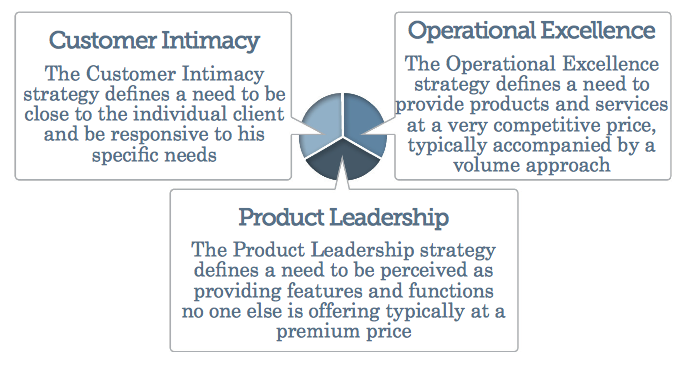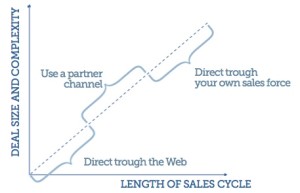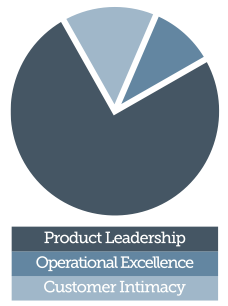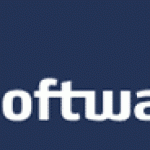The Software Partner Channel and Customer Value Propositions (part 1)
 Software companies have historically had a very strong preference for selling their software indirectly through a channel of resellers[1].
Software companies have historically had a very strong preference for selling their software indirectly through a channel of resellers[1].
The word “channel” is used in the software industry to describe independent companies that assume various roles and obligations in bringing a software product to customers. The definition is rather broad, since the roles and obligations can vary substantially from “simple” reselling to system integration, solution development on top of the software, implementation in terms of consulting, project management, customization, training and support.
The common denominator is the fundamental condition that the individual channel Partner is an independent contractor operating in his own name[2], at his own expense and at his own risk.
When “to partner” or not
What determines whether or not a software vendor shall or can sell his software through an indirect channel of resellers, or if he is better off growing his company by selling the software directly to his customers?
A software vendor will typically choose an indirect channel for scalability purposes and for one or more of the following reasons:
- There is already an established channel of resellers for this type of software.
- He believes he can achieve faster access to the market through the resellers with established customer relationships as opposed to building these relationships though his own organization.
- He believes he will get access to the domain knowledge and skills required for vertical and/or horizontal market coverage, which will be very cumbersome and expensive to achieve though his own organization.
- He believes he can motivate resellers to enhance the software and enlarge the reachable market (eco-system effects).
- He believes he can overcome language and cultural barriers in foreign countries faster than though his own organization.
- He believes that the indirect approach requires less investment, fewer people and less management attention.
Software vendors will typically refrain from using an indirect channel of resellers for scalability purposes for one or more of the following reasons:
- There is no established channel for this type of software
- The business opportunity provided by the software is not interesting for resellers (unknown brand, too little value add, cost of sales too high, too few deals etc.)
- Customers will not accept delivery through resellers
- Partners do not add any value to the customers
- Higher risk of customer dissatisfaction due to poor performing partners
- Having to “give away” gross margin on the software
- Having to “give away” major portions of gross margin on the auxiliary revenue elements of the total solution
- Slower access to the market because of loss of control over sales and implementation resources
- Slower access to the market because the learning curve of the resellers is too steep and too long
- Risk of damaging market reputation due to unprofessional resellers
- Risk of not learning directly from the market, but having to rely on information filtered by the resellers
- Lack of reseller channel operational know-how with the software vendor
The rule of thumb
The rule of thumb in the software industry for when to partner or not is illustrated in fig. 1.
Well-known and simple products requiring few “implementation” services are normally sold directly to the customer through ecommerce portals and call centres.
Very complex solutions with long sales cycles that require substantial implementation services are normally sold directly to the customer through the software vendor’s own direct sales force and implemented by the software vendor’s own professional services organization.
Anything in between may be served through a two or three tier indirect channel of resellers.
The customer value proposition
The decision to go through an indirect channel of independent partners has a profound impact on the software vendor’s customer value proposition.
In generic terms any customer value proposition always has three value elements:[3]
 Software requiring customization and implementation services to work properly for the customer must be delivered through a value proposition where the Customer Intimacy value element is dominant.
Software requiring customization and implementation services to work properly for the customer must be delivered through a value proposition where the Customer Intimacy value element is dominant.
Software consumed without any associated services must be dominated by the Product Leadership value element.
Operational Excellence is a value element with very little impact in the software industry. Without the need for manufacturing, warehousing and physical logistics there is very little optimization and competitive advantage potential in the operational processes in the software industry. Operational excellence is mainly required in project and customer relationship management[4].
Channel Value Adding Requirements
Let’s assume that a software vendor has a very competitive product that doesn’t require any implementation services to be used effectively.
The vendor can choose to sell the product directly to the customers.
Let’s assume that the software vendor believes that channel partners can extend his market reach. What types of customer value propositions should these resellers have?
The software vendor could be interested in resellers with very strong customer relationships, through which the software could be recommended and sold. However these types of partners will not be very interested, as the products require little professional services. They may make a little margin on the products themselves, but without a need for associated services the products will not improve their relationship with the customers and the customers could easily acquire the products elsewhere.
He could also be interested in resellers offering easy access for customers to buy the software. Such resellers would have a strong Operational Excellence value component.
Such resellers would typically provide value to their customers by having a large assortment of products and would provide instant and easy access to purchase and download the products.
These types of resellers live off small margins on large volumes of products and would be very interested in products for which there is a high demand.
Let’s consider that the software vendor’s product requires substantial implementation services to become functional for the customer. He is then clearly interested in a reseller with Customer Intimacy as the dominating value element and Operational Excellence as the second priority, while Product Leadership doesn’t play any role at all.
The software vendor and his resellers never share customer value propositions!
In the last example the software vendor must improve his Operational Excellence value element otherwise he will not be able to recruit and manage his resellers. He is looking for partners with strong Customer Intimacy value elements and some Operational Excellence (project and delivery management). However, resellers with a strong Product Excellence value component are of no interest to the software vendor.
The fundamental principles of competitive value creation
With the book “The Discipline of Market Leaders” – published in 1995 – Michael Treacy and Fred Wiersema introduced the principles behind the three value elements. The book also introduced the relationship between the customer value proposition and the operating processes, the management systems, the business structure and the culture required to deliver on the value proposition.
[1] The term ”reseller” is here used for any type of 3rd party company engaged in selling a software brand to his customers irrespective of the degree of value add.
[2] In channels designed as franchises however, this is not the case.
[3] Please see the section: “The fundamental principles of competitive value creation” below.
[4] For software delivered as a cloud based service there may be a substantial operational excellence element. Availability, price and the quality of the Service Level Agreement are important elements for the customers.











